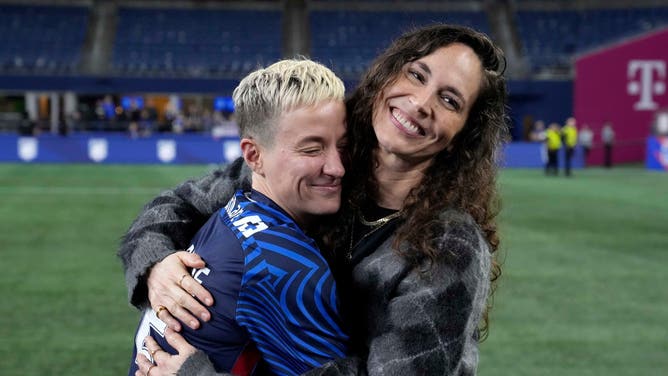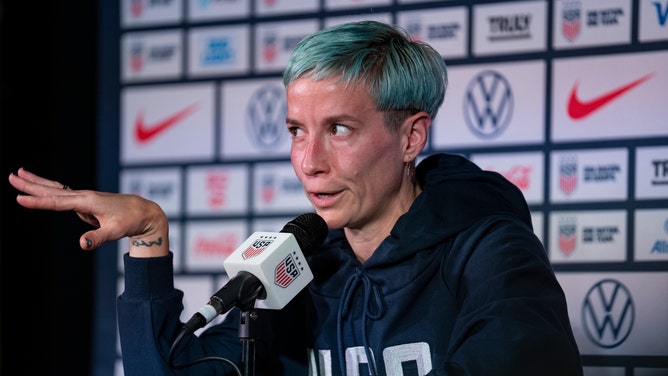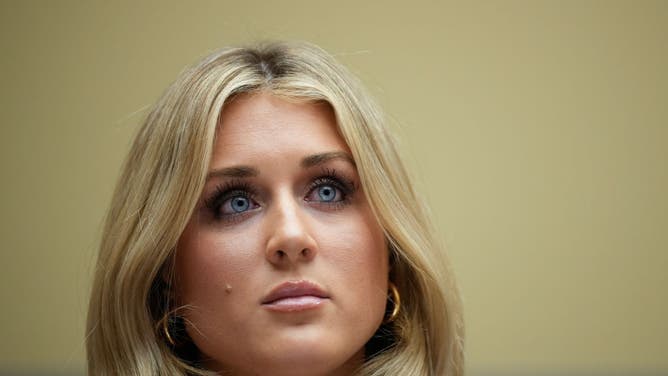Megan Rapinoe Joins Group Advocating For Men To Play Sports Against Women
The NCAA Board of Governors is expected to meet on Thursday to discuss - and potentially vote - on the issue involving transgender women, more commonly referred to as biological men, competing in women's college sports. As a result, a number of current and former athletes who lack common sense or a basic understanding of biology have come together to release letters urging the NCAA not to ban trans women from competing against biological women at the collegiate level.
Megan Rapinoe, along with her fiancee and former WNBA star Sue Bird, headline the group that includes more than 400 current and former professional and collegiate athletes, 300 academics, and around 100 separate advocacy organizations.

L to R: Megan Rapinoe and Sue Bird. Photo: Stephen Brashear-USA TODAY Sports
Each person who sees nothing wrong with biological men competing against women released separate letters on Tuesday that were coordinated by the LGBTQ sports advocacy group Athlete Ally.
According to the former USWNT star, and the hundreds of others on Rapinoe's side, keeping women's sports exclusive to biological women would place the NCAA on the wrong side of history.
"We call on you to be on the right side of history and affirm that sport is truly for us all," the letter signed by the athletes and academics said. "Do not ban transgender women from NCAA women’s sports."

Megan Rapinoe. Photo: Jenna Watson-USA TODAY Sports
Rapinoe issued a statement of her own, which completely misrepresents the actual conversation being had.
"The time is now for the NCAA and the nationwide athletic community to speak up and affirm that sports should be for everyone, including transgender athletes," Rapinoe said in the statement, which was released by Athlete Ally.
The debate about transgender athletes is not about whether or not they should have the right to compete, but whether they should have the right to compete against biological women. Rapinoe and others constantly lump the two very separate conversations into one to mislead members of the public who haven't been paying close enough attention.
Rapinoe stepping into the spokesperson's role for a group pushing for biological men to compete against women comes as no surprise.
In July 2023, Rapinoe told Time that she would gladly welcome a transgender athlete onto the USWNT, and anyone who disagrees with her is transphobic.
"Absolutely," Rapinoe said when asked if she'd welcome a biological man onto the women's national team.
"You're taking a 'real' woman's place,' that's the part of the argument that's still extremely transphobic. I see trans women as real women. What you're saying automatically in the argument—you're sort of telling on yourself already—is you don't believe these people are women. Therefore, they're taking the other spot. I don't feel that way."
While Rapinoe could be viewed as the face of the LGBTQ group hoping trans athletes can compete against biological women and take opportunities away from them, on the other side of that coin stands OutKick's Riley Gaines and thousands of others fighting for women's rights.

Riley Gaines. (Photo by Drew Angerer/Getty Images)
Athlete Ally may have nearly 1,000 signed letters on its behalf, the Our Bodies, Our Sports coalition has sent letters and emails to the NCAA board members from more than 3,000 current and former female athletes and coaches urging the NCAA to "protect women's sports."
That 3,000 figure has moved to approximately 5,000, according to OutKick's Dan Zaksheske, who first reported on the Our Bodies, Our Sports coalition.
According to the coalition, "Male athletes have stolen over 924 trophies, medals, and titles from women and girls across 448 different competitions and over 30 different sports."
For Our Bodies, Our Sports, transgender athletes competing against biological has nothing to do with politics, and everything to do with common sense. The coalition's message is simple: biological men should not compete in women's sports.
The most-recent update to the NCAA transgender athlete policy lays out three year-by-year phases for the implementation of new guidelines.
Beginning August 1, 2024, the NCAA is requiring transgender student-athletes to provide documentation no less than twice annually (and at least once within four weeks of competition in NCAA championships) that meets the sport-specific standard (which may include testosterone levels, mitigation timelines and other aspects of sport-governing body policies) as reviewed and approved by the Committee on Competitive Safeguards and Medical Aspects of Sports.
The NCAA's current transgender student-athlete policy, which was last updated in April 2023, forces each sport to be determined by the policy for the national governing body of that particular sport.